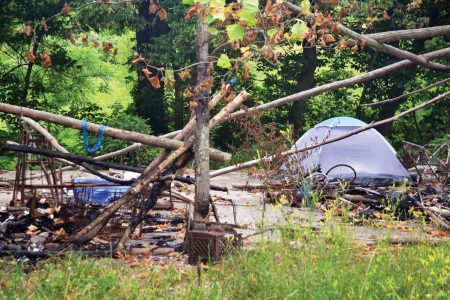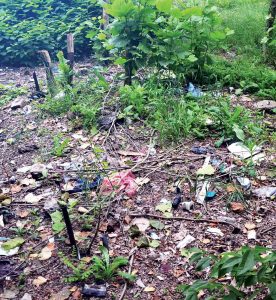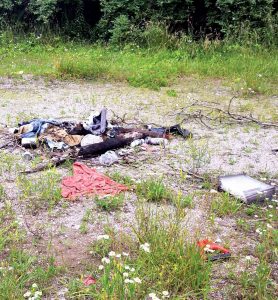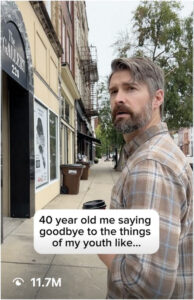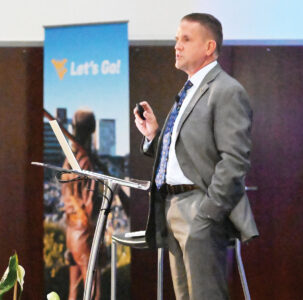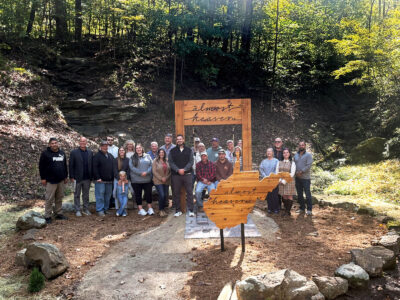Parkersburg business owners express concerns about homeless population
- A homeless camp near the Seventh Street and U.S. 50 interchange in Parkersburg. Some local businesses have begun having problems with homeless people on their properties during business hours. Someone also burned parts of the camp. (Photo by Brett Dunlap)
- A trail near a local homeless encampment near the Seventh Street-U.S. 50 interchange. Trash and other debris were scattered about. (Photo by Brett Dunlap)
- Another campsite near the Seventh Street and U.S. 50 interchange in Parkersburg. Local businesses have been having trouble with the homeless coming onto their properties at all hours of the day and night. (Photo by Brett Dunlap)
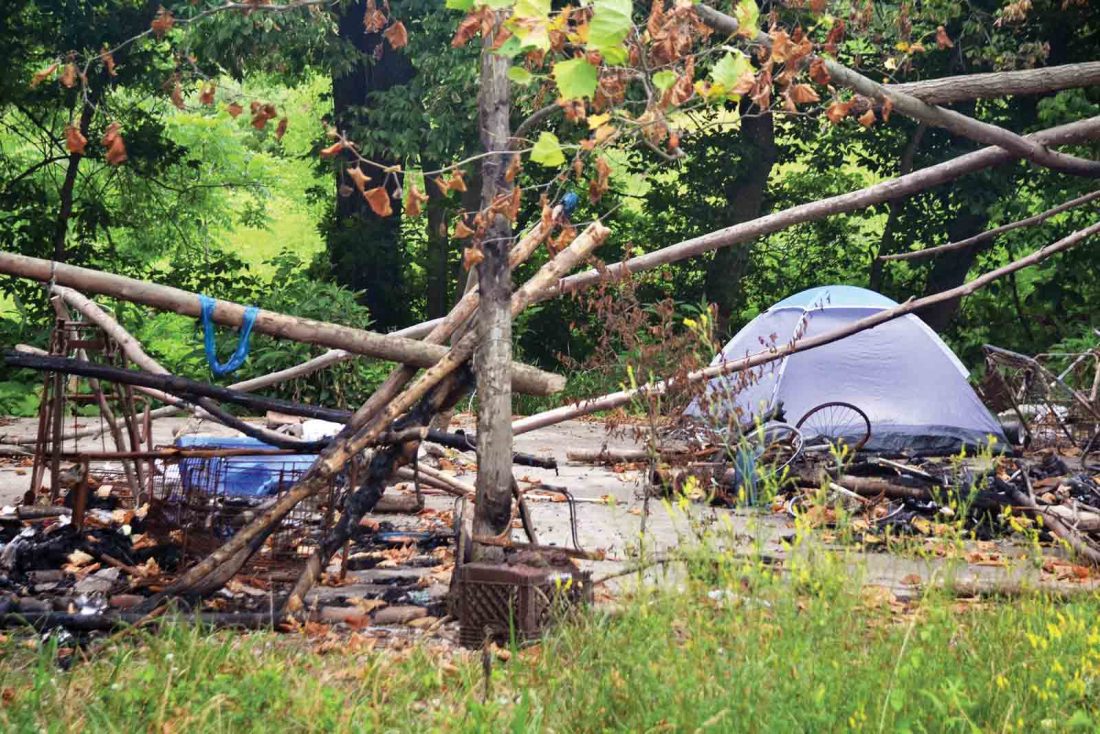
A homeless camp near the Seventh Street and U.S. 50 interchange in Parkersburg. Some local businesses have begun having problems with homeless people on their properties during business hours. Someone also burned parts of the camp. (Photo by Brett Dunlap)
PARKERSBURG –Local business owners say they continue to have problems with the homeless population.
People coming onto their properties during business hours, loitering, bothering customers and other concerns have been regularly occuring, they say.
T.R. Hathaway, owner of Superior Toyota Hyundai in Parkersburg, has been dealing with a homeless encampment that has popped up on state-owned property behind the dealership and McDonald’s on Seventh Street near the U.S. 50 interchange.
Some of the people from the tent city have been walking through his property, during business hours, asking customers and employees for money, going through the cigarette butt cans and the dumpster on his property trying to find something they can smoke or more.
Hathaway said it has become a concern for some of his customers, so much so some people are leery about coming onto the lot. Some of the homeless have regularly taken up positions around the McDonald’s panhandling for money or taking advantage of free Wi-Fi service.
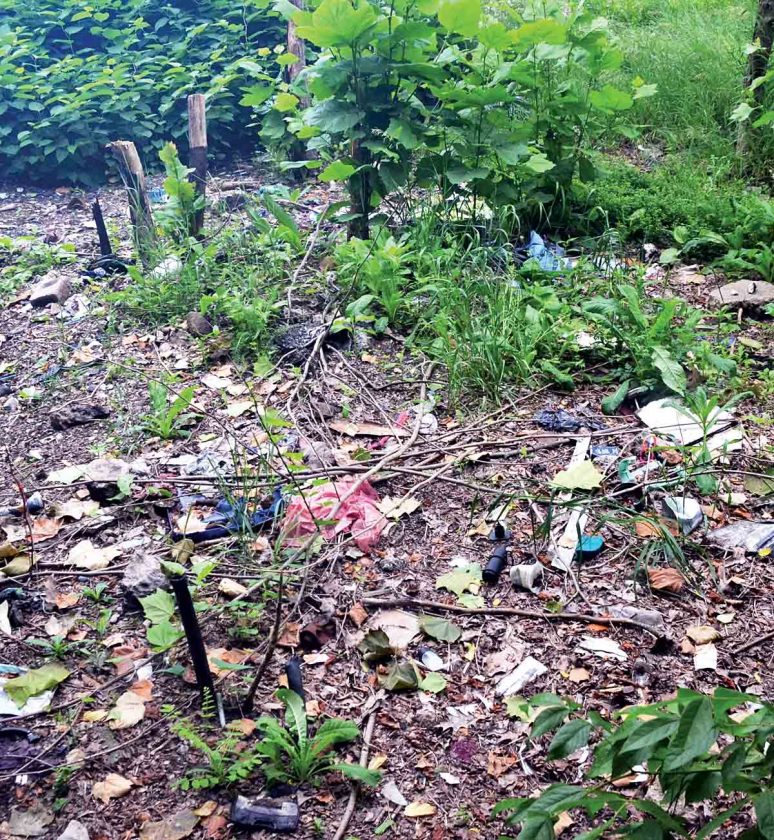
A trail near a local homeless encampment near the Seventh Street-U.S. 50 interchange. Trash and other debris were scattered about. (Photo by Brett Dunlap)
Residents have had to deal with people on drugs, trespassers including those who have entered their homes, he said. Overdoses have occurred in public restrooms and elsewhere, Hathaway said.
“It is becoming a problem,” Hathaway said.
His people have found used needles along Seventh Street and between buildings.
Joe Kincheloe, owner of Kincheloe Motors in Parkersburg, said he, too, has had to deal with people walking onto his property at all hours.
Both the Wood County Commission and Parkersburg City Council have had discussions last year about the concerns related to the local homeless population.
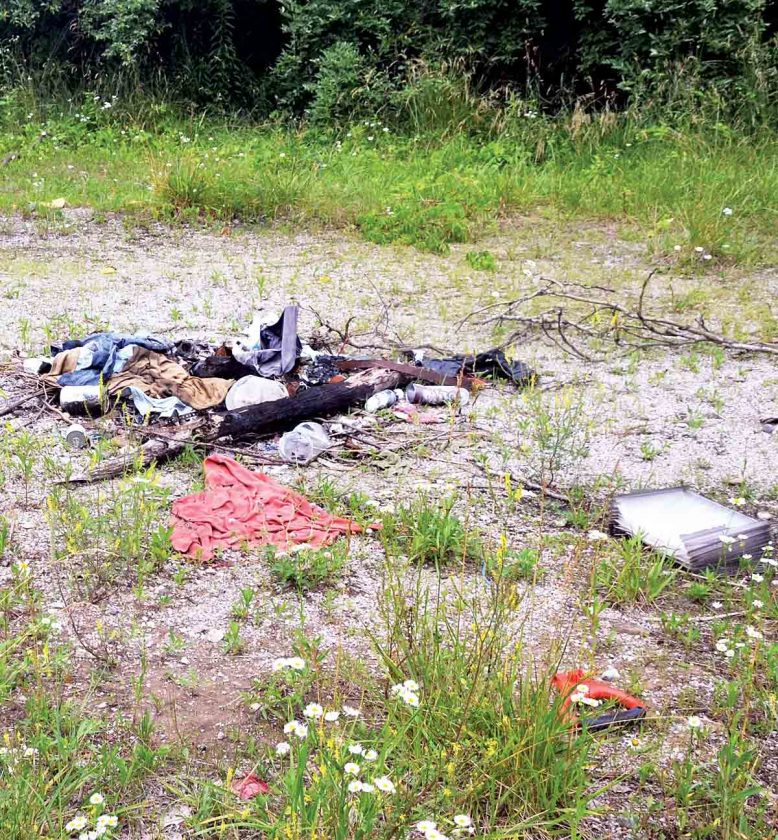
Another campsite near the Seventh Street and U.S. 50 interchange in Parkersburg. Local businesses have been having trouble with the homeless coming onto their properties at all hours of the day and night. (Photo by Brett Dunlap)
Residents have presented complaints to local officials about transients walking through neighborhoods, being disruptive, committing petty crimes, trespassing onto property and other concerns.
Officials have received complaints of people wandering about the streets at all hours of the day and night. Because many of them wear backpacks, they have been nicknamed the “backpackers” or the “backpack people.”
Officials wanted to have community hearings about the problem last fall, but the COVID-19 pandemic has such plans on hold.
Some believe the rise in drug treatment centers in the area is what started the problem.
Both the county commission and Parkersburg city officials have had discussions about people in the area who at one time were at a local recovery program. However, some of them may have failed out of the program and were just let out into the community.
Local officials have said if anyone fails a recovery program, they want the people to be returned to from where they came, put back into the custody of a family member as opposed to just being let out the door and becoming part of the homeless problem for this community.
That is among answers Kincheloe wants.
“I would like questions to be asked that at this point we have no answers,” he said. “What is the exit plan? When they come here, they don’t go back home. Many of their families have written them off.”
Kincheloe said Mayor Tom Joyce and other local officials are doing the best they can in managing the problem, but their ability to take action has been hampered.
Part of the problem was how fast these places are able to establish, Jane Kincheloe, Kincheloe’s daughter, said.
“At the time, the opioid crisis was huge in West Virginia and the Legislature believed it needed to get treatment centers into West Virginia quickly,” she said. “Officials decided to forego the Certificate of Need, an application proving that we need rehab facilities in West Virginia.
“Now we are being inundated because our real estate is cheap. It is an opportunity for out-of-state people coming in and starting rehab facilities.”
During the 2017 legislative session, the Legislature made significant changes to the West Virginia Health Care Authority and Certificate of Need, said Allison C. Adler, director of Communications for the West Virginia Department of Health and Human Resources.
Among changes was language added to the code stating “…the Legislature finds that a need exists and these health services are exempt from the certificate of need process,” Adler said.
Included in the listed exemptions is the construction, development, acquisition or expansion of an alcohol or drug treatment facility and drug and alcohol treatment services.
“As a result of this legislative change, the Health Care Authority has received numerous exemption applications for the development of alcohol and drug treatment facilities,” Adler said. “As long as the proposed project meets the definition of an alcohol or drug treatment facility or service, the Health Care Authority is required to issue a decision stating that the applicant is exempt from Certificate of Need review.”
To obtain an exemption from the Health Care Authority for the development of an alcohol or drug treatment facility or service, the applicant has to submit an exemption application that provides information as to who the applicant is, where the project will be located and an explanation of the services to be provided.
A $1,000 filing fee was effective until June 4. In the 2020 legislative session, the filing fee was eliminated. Therefore, after June 4, an applicant no longer has to pay any filing fee to obtain an exemption.
Delegate John Kelly, R-Wood, said he sponsored a bill a few years ago that was passed and signed by the governor.
It provided $22 million in a fund, the Ryan Brown Fund, and it was distributed around the state to establish treatment facilities because the state didn’t have many. Around $4 million of that money came to Wood County with $3 million going to St. Joseph’s Landing and $1 million to Westbrook Health Services.
“That is the only bill we have passed, that I am aware of, that had anything to do with treatment centers within the state,” Kelly said.
Kelly believes there has been some confusion in where federal laws were passed that allowed groups to bypass a lot of the local standards to put treatment and homeless facilities in place which has led to discussions of a treatment facility being put in place at the former federal building on Juliana Street as well as putting people in an old nursing home on Kennedy Avenue.
“It is a federal regulation, not a state regulation,” Kelly said.
Kelly said he feels the local need for treatment facilities has been filled.
“I don’t believe that there is anyone on a waiting list now, waiting for a treatment bed,” Kelly said.
He said the focus now should be on educating young people, at an early age, about the dangers of drug and alcohol addiction.
Kelly was involved in a recent conference call with local business owners and others about the homeless as well as the proposed treatment center at the old federal building.
Kelly said he drafted a letter to the governor asking for assistance as they were dealing with a federal regulation and there wasn’t much they could do to stop it. He provided the letter to the business people on that call and asked them to draft their own letters asking for support.
“We do have a problem,” Kelly said. “I am willing to work with the city and state. I am willing to work with anyone we need to work with.
“We do need to take care of this issue. It is a problem waiting to get worse if we don’t do something.”
Hathaway said he has called the Parkersburg Police Department and the Wood County Sheriff’s Department about the problem in the area behind his business.
Since he doesn’t own the property upon which the tent city is located, there is little law-enforcement can do, he was told.
Sheriff Steve Stephens said because the property is owned by the state, the state would have to request law enforcement to remove the people there.
“I appreciate the situation, but I can’t remove people off of property without the property owner’s request,” Stephens said.
Local police agencies can go on state property when needed, state transportation officials said.
“Law enforcement has unfettered access to state property,” said Brent Walker, director of communications for the West Virginia Department of Transportation.
Officials don’t have a clear idea of how many homeless are in the area.
Efforts are underway to get a count of the local homeless population for the 2020 Census, said Pam Brust of the Wood County Complete Census Count Committee.
“According to the latest news from the Census Bureau, the new dates for counting the homeless, which were originally scheduled for March 30-April 1 have been moved to Sept. 22-24 due to health and safety concerns related to COVID-19,” Brust said. “In September the Census Bureau will send specially trained census takers to count the homeless at local shelters, soup kitchens, food vans and other locations previously identified as well as locations where homeless individuals are known to camp at night.”
The bureau will be coordinating with local service providers and advocacy groups to conduct this work.
“Because these populations are transitory they are often difficult to count, but are also one of the groups most in need of the services provided by the grants, which are based on the Census numbers,” Brust said.
Tim Baer, engagement specialist on Street Outreach with Westbrook Health Services said they do a count every January.
During outreach the numbers are higher than in the winter months. Outreach deals with people who are outdoors.
They had around 44 people at end of January.
They have been able to successfully place people in permanent housing now that landlords are starting to open up and renting to people again.
“We have been able to get people into permanent housing and off the streets,” Baer said.
One thing he has seen is people who are homeless during the winter months are so because they work during the warmer months. However with the pandemic, many businesses have been slower to return to business.
“We do have a lot more individuals than we would see from November to February,” Baer said. “They are more permanently homeless because they have not been able to return to work.
“A lot of them will work March through November and that has not been the case for a lot of people this year.”
Pandemic regulations have caused certain businesses to remain closed or have been slow in starting back up. Many people have remained in this area because those jobs have not opened back up yet and the people haven’t had to travel anywhere to work those jobs, Baer said.
The Kincheloes don’t think the community has any input into whether facilities should come into the area. Hathaway feels local citizens did not have much input in addressing how the problem has evolved.
“I care about these people, as far as fixing them I don’t know what that fix happens to be,” Joe Kincheloe said. “I’m stumped on that one and a lot of people are.
“What we want is a safe community for our kids to grow up in.”
Kincheloe said he is concerned about the type of area his granddaughter is growing up in.
“People doing drugs, may be good people who have gone down the wrong road,” he said. “I believe everyone has good in them.”
However, people under the influence do not reason like others and they become a danger, not only to others but to themselves, he said.
He feels many people in the community don’t know where they can turn as they feel a number of the rehab centers are being brought in without the proper oversight or a vetting process.
“I don’t believe we should be the hub for bringing these people in,” Kincheloe said. “I believe that each community should take care of their own.
“That is definitely not what is taking place. Other communities are shipping their problems here.”
Hathaway said the problem is resulting in people’s property values being affected which impacts property taxes collected and causes other problems.
“What is the cost to people in this community,” he asked.
Hathaway prays that people who truly want help can find it and get better. He wants to know if the people who need it are truly getting help or if the area has becoming a holding place where people congregate.
Hathaway said he knows people dealing with addiction and understands what a struggle recovery can be.
He said it is up to the people themselves to want to get help and really seek it out. There are people out there who enter programs to avoid going to jail and end up back on the streets again.
“We all need help from time to time,” Hathaway said. “However, do we have the resources to help them here or are we just warehousing people?
“At the end of the day, I want a safe community for our citizens. I want to be able to help the people who really want to be helped.”
Commission President Blair Couch said numerous agencies are engaged with the local homeless population, including the Homeless Collation, the Mid-Ohio Valley Health Department, the Salvation Army, the United Way and the Latrobe Street Mission, among others.
“There are people having conference calls weekly,” he said adding with the COVID-19 pandemic many are working on getting the homeless tested. “Everyone is engaged.”
However, citing local media reports going back years, there has always been homeless people in the area.
“There has always been a homeless population in Wood County and there will always be,” Couch said. “The challenge has been trying to provide them with temporary housing.
“We are always going to have the homeless by choice, but there are social services and organizations available to help them.”
Contact Brett Dunlap at bdunlap@newsandsentinel.com.

